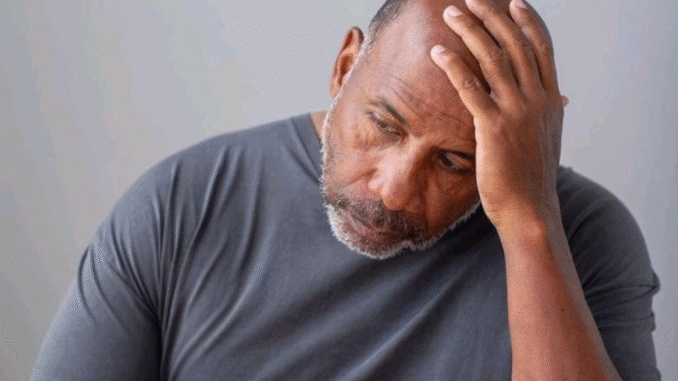
1. Hormonal Changes and Declining Testosterone
As men age, their testosterone levels naturally decline, typically starting in their 30s and continuing gradually. This drop, sometimes called “andropause,” can lead to symptoms like fatigue, low energy, reduced libido, and mood changes—all of which are linked to depression. Low testosterone can also affect brain chemistry, reducing serotonin and other mood-regulating neurotransmitters. A 2018 study in The Journal of Clinical Endocrinology & Metabolism found that men with lower testosterone levels were more likely to report depressive symptoms….CONTINUE FULL READING>>
What to Do: Consult a healthcare provider to check testosterone levels. Lifestyle changes like regular exercise, a balanced diet, and adequate sleep can help maintain healthy hormone levels. In some cases, hormone replacement therapy may be an option, but only under medical supervision.
2. Loss of Identity and Purpose
Men often tie their sense of self to their roles—as providers, professionals, or active contributors to society. As they age, retirement, career stagnation, or empty-nest syndrome can strip away these identities, leading to feelings of purposelessness. The societal expectation for men to “tough it out” can make it harder to process these transitions, increasing the risk of depression. For example, a 2020 study in The Gerontologist noted that men who retire without a clear plan for meaningful activities are more prone to mental health struggles.
What to Do: Explore new hobbies, volunteer work, or part-time roles to maintain a sense of purpose. Joining community groups or mentoring younger individuals can also provide fulfillment and connection.
3. Social Isolation and Loneliness
What to Do: Actively nurture relationships by scheduling regular meetups with friends or family. Join clubs, fitness groups, or local organizations to build new connections. Therapy or support groups can also provide a safe space to share feelings.
4. Health Challenges and Physical Decline
What to Do: Prioritize physical health through regular checkups, a nutrient-rich diet, and moderate exercise like walking or strength training. Addressing physical health can improve mood and energy levels. Mindfulness practices, such as yoga or meditation, can also help manage pain and stress.
5. Stigma Around Seeking Help
Men are often socialized to suppress emotions and avoid vulnerability, which can prevent them from seeking help for depression. This stigma is particularly pronounced in older generations, where mental health discussions were less common. As a result, many older men suffer in silence, allowing depression to worsen. The National Institute of Mental Health notes that men are less likely to seek therapy or medication for depression, leading to higher rates of untreated mental health issues.
What to Do: Normalize seeking help by starting with small steps, like confiding in a trusted friend or family member. Professional support, such as therapy or counseling, can be highly effective. Telehealth options make it easier to access help discreetly. Encouraging open conversations about mental health with peers can also reduce stigma.
Other Contributing Factors
- Financial Stress: Retirement or reduced income can create financial anxiety, a known trigger for depression.
- Relationship Changes: Divorce, loss of a partner, or strained relationships can increase feelings of loneliness and despair.
- Existential Reflection: Aging often prompts men to reflect on their life’s achievements or regrets, which can lead to existential crises or depressive thoughts.
Recognizing the Signs of Depression
Depression in older men may not always look like sadness. Common signs include:
- Irritability or anger
- Fatigue or low energy
- Loss of interest in hobbies or social activities
- Sleep disturbances (insomnia or oversleeping)
- Difficulty concentrating or making decisions
- Physical complaints, like unexplained aches
If you or someone you know exhibits these signs for more than two weeks, it’s time to seek professional help.
How to Support Mental Health as You Age
- Stay Active: Regular exercise, even light activities like walking, boosts endorphins and improves mood.
- Eat Well: A diet rich in omega-3s (fish, nuts), antioxidants (berries, greens), and whole grains supports brain health.
- Build Connections: Prioritize relationships and seek out community activities to combat loneliness.
- Seek Help Early: Don’t wait for depression to become severe. Therapy, support groups, or medication can make a difference.
- Practice Mindfulness: Techniques like meditation or journaling can help process emotions and reduce stress….CONTINUE FULL READING>>>
